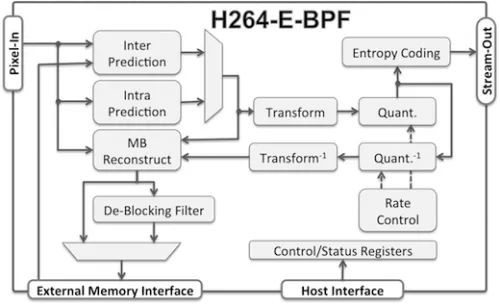The H264-E-BPF IP core is a video encoder supporting the Constrained Baseline Profile of the ISO/IEC 14496-10/ITU-T H.264 standard. It Implements an ultra-high throughput, UHD/4K capable hardware encoder that is optimized for ultra-low-latency video streaming at low bit rates.
The H264-E-BPF encoder requires less silicon area than most equally capable hardware H.264 encoders—approximately 250K gates—allowing for very cost-effective implementations. Its small silicon footprint, low external memory bandwidth requirements, and zero software overhead enable high-throughput H.264 coding at an extremely low energy cost. The encoder is able to process UHD/4K video when mapped on modern ASIC technologies, and Full-HD when mapped on FPGAs.
Despite being small, the H264-E-BPF produces high-quality video, especially at low bit rates, and is suitable for systems with low latency requirements. It uses constant quantization to output video streams of Variable Bit-Rate (VBR), or automatically regulates quantization multiple times within a frame to output Constant Bit-Rate (CBR) streams. In CBR mode it responds rapidly to temporal or spatial changes in the video content. This can be combined with an artifacts-free Intra-Refresh coding implementation to effectively eliminate bit rate peaks, while preserving the periodic intra-coded references. As a result, the stream buffers can be smaller than those typically required, and the end-to-end latency can be brought down to frame or sub-frame levels. Video quality at low-bit rates is preserved, as the encoder intelligently uses block-skipping and quantization coefficient thresholding to reduce bit rate at minimal quality loss, and uses the in-loop deblocking filter to eliminate the blocking artifact.
The core was designed for ease of use and integration. Once initially programmed, it operates without any assistance from the host processor. The encoder’s memory interface is extremely flexible: it operates on a separate clock domain, is independent from the external memory type and memory controller, and is tolerant to large latencies. The core is optionally delivered with a raster-to-block converter, and wrappers for AMBA® AHB, AXI, or AXI-Streaming buses are available.
Customers can further decrease their time to market by using CAST’s integration services to receive complete video encoding subsystems. These integrate the encoder core with video and networking interface controllers, networking stacks, or other CAST or third-party IP cores.
The H264-E-BPF IP core is designed using with industry best practices and has been production proven multiple times. Its deliverables include a complete verification environment and a bit-accurate software model.
Ultra-Fast AVC/H.264 Baseline Profile Encoder Core
Overview
Key Features
- Ultra-fast, production-proven, AVC/H.264 encoder
- Options for one or two cycles per pixel
- UHD/4K and very high frame rates at lower resolutions in ASICs and FPGAs
- Standard Support
- ISO/IEC 14496-10/ITU-T H.264 Constrained Baseline Profile specification
- Interlaced Video using Main Profile syntax
- Output Annex B NAL byte stream decodable by Baseline, Main, and High Profile decoders
- Input Video Formats
- Progressive or Interlaced, 4:2:0 YCbCr input with 8 bits per color sample
- Up to UHD/4k in ASICs; up to Full-HD in FPGAs
- Optional multichannel encoding
- Low Latency and Low Bit Rates with Fewer Artifacts
- Constant Bit-Rate (CBR) output for smaller stream buffers and end-to-end latency
- Advanced rate control regulates Qp multiple times within a frame, and rapidly responds to temporal or spatial video variations
- Enables artifacts-free Intra-Refresh to eliminate bit rate peaks of I frames
- Block skipping, Quantized coefficients thresholding, and in-loop deblocking filter improve quality at low bit rates
- Small and Low Power
- 250K gates and 375 kbits of RAM (for two-cycles-per-pixel configutation)
- Uses less power than equally capable hardware H.264 encoders thanks to its smaller silicon footprint and small external memory bandwidth
- Consumes much less power than any equivalent software, or software-hardware encoder
- Ease of Integration
- Zero CPU overhead, stand-alone operation
- Flexible external memory interface uses separate clock, is independent of memory type and tolerant to latencies
Block Diagram

Deliverables
- Source-code HDL (Verilog or VHDL) (ASICs) or as a targeted netlist (FPGAs)
- Sophisticated self-checking Testbench
- Synthesis scripts
- Simulation script, vectors and expected results
- Software (C++) Bit-Accurate Model and test-vector generator
- Comprehensive user documentation
Technical Specifications
Maturity
Production Proven
Availability
Now